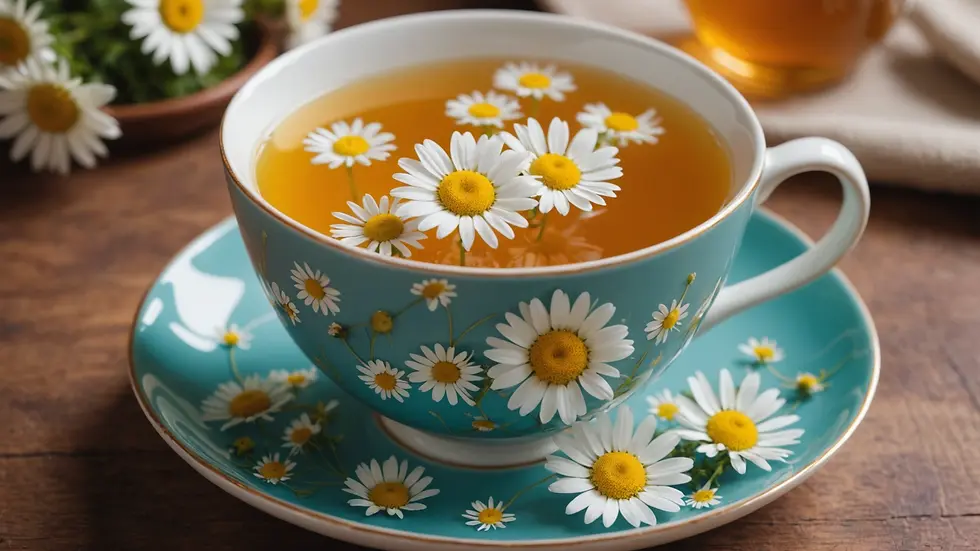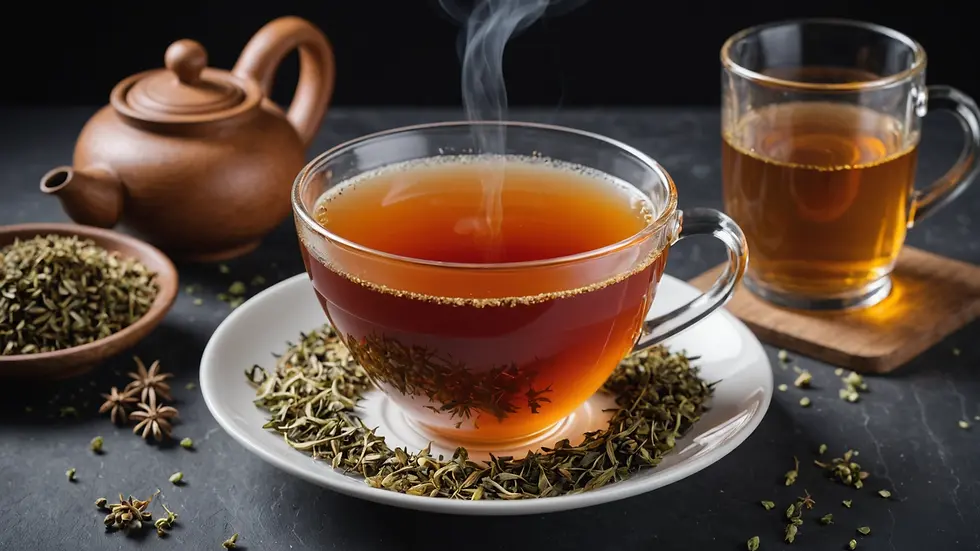Uncovering the Mystery: The Surprising Ways Herbal Tea Enhances Your Quality of Sleep
- StupendousAI
- Jan 5
- 4 min read
Sleep is a fundamental aspect of our lives, significantly impacting our mood and overall health. Yet, many struggle to achieve restorative sleep. For centuries, herbal tea has been valued for its calming effects, often suggested as a natural solution for insomnia. This post highlights the benefits of drinking herbal tea for better sleep, illustrating how different herbs can promote a peaceful night.
Understanding Sleep and Its Importance
Sleep allows our bodies to repair and rejuvenate. It enhances cognitive functions, supports our emotional health, and strengthens our immune system. Most adults need 7 to 9 hours of sleep each night to function optimally. However, a staggering 30% of adults report sleep-related issues, often due to stress and lifestyle choices.
As sleep disorders rise, natural solutions are gaining attention. Herbal teas provide a gentle, effective means to relax and prepare for sleep.
The Connection Between Herbal Tea and Sleep
Across cultures, herbal teas have been cherished for their calming effects. The benefits of herbal tea for sleep come from the natural compounds in these plants. They help soothe the nervous system and create feelings of tranquility, which are essential for a restful night.
Certain herbs also play a role in reducing anxiety and tension—common barriers to a good night's sleep. Drinking herbal tea before bed signals your body that it's time to unwind.
Popular Herbal Teas for Sleep
Chamomile Tea
Chamomile tea is one of the most recognized herbal remedies for sleep. This gentle tea has been used for centuries and is rich in antioxidants. It contains apigenin, a compound that binds to brain receptors to encourage relaxation and sleepiness. Research shows that those who drink chamomile tea may fall asleep 15 minutes faster than those who do not.

Lavender Tea
Lavender is famous not just for its pleasant aroma, but also for its sleep-inducing properties. Drinking lavender tea has been found to lower heart rate and blood pressure, creating a calm atmosphere conducive to sleep. In studies, participants who inhaled lavender or drank lavender tea reported improvements in sleep quality by 20%.
Valerian Root Tea
Valerian root is a popular option among herbal teas for sleep. Known for its sedative properties, valerian tea has been used for centuries to combat insomnia and anxiety. Valerian works by increasing gamma-aminobutyric acid (GABA) levels in the brain, which promotes relaxation. While its flavor may not be appealing to everyone, research indicates that valerian can reduce the time taken to fall asleep by 30%.

How Herbal Tea Creates a Relaxing Bedtime Routine
Adding herbal tea to your evening routine can significantly aid relaxation. A consistent ritual signals to your body that it's time to disconnect and prepare for sleep. The simple act of brewing and enjoying a warm cup of herbal tea promotes both physical and mental relaxation.
Establishing a specific evening time for this routine can foster a moment of stillness. Focusing on your tea can enhance its soothing effects and prepare your body for rest.
Additional Benefits of Drinking Herbal Tea
Aiding Digestion
Herbal teas like peppermint and ginger can support digestion, helping alleviate discomfort that might disrupt sleep. Reports show that 70% of people experience a level of discomfort that affects their sleep quality. Drinking digestive-friendly teas can create an environment for better rest, allowing your body to feel comfortable at bedtime.
Stress Relief
Stress is a significant barrier to sleep in modern life. Herbs such as lemon balm and passionflower are known for their stress-relief qualities. Drinking these teas can provide a calming effect after a hectic day, easing you into a more relaxed state as bedtime approaches.
Hydration Before Sleep
Choosing herbal teas, which are typically caffeine-free, is an excellent way to stay hydrated at night. Proper hydration is essential for overall health, and sipping herbal tea can help you maintain fluid balance without disrupting sleep.
Tips for Choosing and Brewing Herbal Tea for Sleep
Selection
When picking herbal teas for sleep, look for those labeled explicitly for relaxation or calming effects. Whenever possible, select organic options to avoid pesticides and additives that might interfere with sleep quality.
Brewing
How you prepare your herbal tea can impact its effectiveness:
Use fresh herbs: Brewing with fresh herbs often yields more health benefits and flavor.
Steep longer: Allow the tea to sit for 5 to 10 minutes to extract more of its beneficial compounds.
Avoid additives: Keep the tea pure by skipping sugars or milk, as they can alter the intended effects.
Incorporating Herbal Tea into Your Lifestyle
Finding Your Perfect Blend
Since everyone responds differently to herbs, experiment with various herbal teas to determine what works best for you. There are endless combinations; explore different blends to make your tea-drinking experience enjoyable and personalized.
Timing is Key
Aim to sip herbal tea about 30 to 60 minutes before bedtime. This timeframe allows your body to absorb the tea's calming properties and helps set the stage for peaceful sleep.
Common Misconceptions About Herbal Tea and Sleep
Not a Cure-All
While herbal tea can promote relaxation and support better sleep, it is not a definitive cure for serious sleep disorders. Always consult a healthcare professional for persistent sleep issues. Incorporating herbal tea should be part of a comprehensive approach that also includes good sleep hygiene and lifestyle adjustments.
No Side Effects?
Although usually safe, some herbal teas can interact with medications or trigger allergic reactions. It's always best to check with your doctor before introducing new herbal teas into your routine, particularly if you are pregnant or have underlying health conditions.
Finding Your Path to Restful Sleep
Drinking herbal tea can enhance sleep quality through its calming properties. Whether you enjoy chamomile, lavender, valerian root, or another herbal option, integrating these teas into your nightly routine can foster a relaxing environment conducive to sound sleep.
As stress continues to impact daily life, herbal teas offer a gentle and effective avenue towards relaxation and improved sleep quality. So, the next time you find yourself tossing and turning, consider brewing a cup of soothing herbal tea. The restful nights you seek may be just a sip away.




Comments